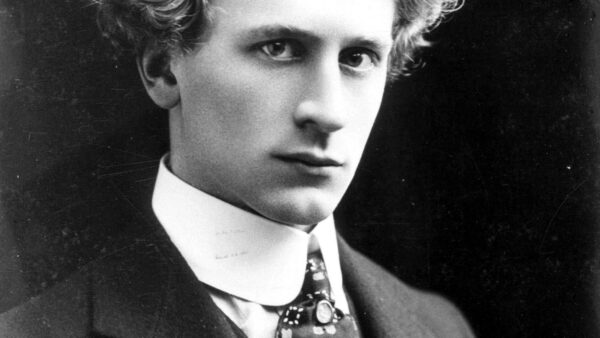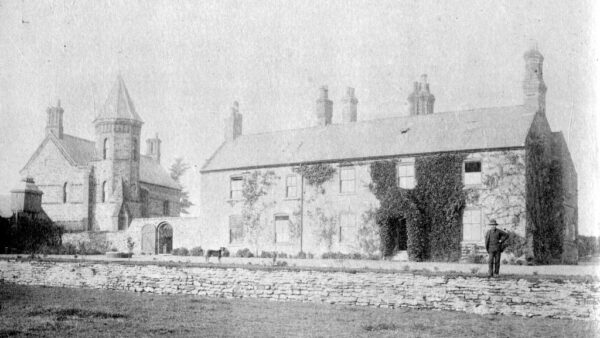Joseph Taylor and Brigg Fair
Henry Freudenberg, Bishop Grosseteste University
Early and Personal Life
This article looks at the life of Joseph Taylor, a Lincolnshire folk singer who helped revive folk music across England. Discover the story of his life, how he popularised the song ‘Brigg Fair’, and the legacy he left behind.
Joseph Taylor was born on 10 September 1833, in the Lincolnshire village of Binbrook. He moved to the North Lincolnshire village of Saxby-All-Saints when he was nineteen years old to improve his skills as a carpenter. He also moved there to study arboriculture, the practice of researching, cultivating, and managing woodland plants.
Taylor married Eliza Hill, and they had seven children together, James, Betsy, John, Joseph, Anne, Frederick, and Mary. Later in life, Taylor worked as a farm bailiff, and sang for his own pleasure as well as in competitions. His granddaughter, E. Marion Hudson, noted that throughout his life, he had a constant interest in music.

‘Brigg Fair’
‘Brigg Fair’ is a traditional English folk song that Taylor is known for popularising. However, the story behind him learning it is quite an interesting one.
A group of Romani people had arrived in the North Lincolnshire town of Brigg in around 1850. Brigg was chosen as it was a common meeting point for them to socialise. Taylor heard this news from his mother, and he left his home every night to spy on the Romani people. The reason for this was that he hoped to hear them sing, as he enjoyed it and it interested him.
Taylor listened to the group sing for a few nights, getting braver and closer to them as each night passed. One night, the leader of the group approached him, inviting him to join them. They sang many songs together, one of which being ‘Brigg Fair’. The song describes the annual horse fair held in Brigg on 5 August, dating back to 1205. Taylor only memorised two verses of the song, but he still managed to popularise it after singing it in competitions.
The two verses Taylor had memorised:
It was on the fifth of August,
The weather hot and fair,
Unto Brigg Fair I did repair,
For love I was inclined.
I got up with the lark in the morning
With my heart so full of glee,
Expecting there to meet my dear,
Long time I wished to see.
Meeting Percy Grainger
Taylor reluctantly entered his first singing competition in 1905, the North Lincolnshire Musical Competition, held in Brigg. He won first place in the folk category with a version of the song ‘Creeping Jane’. Percy Grainger, an Australian-born composer and pianist, heard him perform in this competition, taking an interest in his singing talent.
Taylor won the competition the following year, singing the song ‘Brigg Fair’. Grainger enjoyed the song so much he made note of it for future reference. In the same year, Grainger invited Taylor to Brigg to record him singing with a phonograph. This made Taylor the first ever English folk singer to be recorded for commercial purposes. Grainger further recorded Taylor’s singing in 1908 in London, recording a dozen of his songs for release on gramophone discs.
Taylor and Grainger had a unique relationship, built on respect for one another. Grainger loved Taylor’s singing, describing him as ‘…the most exceptional folk singer I have ever heard’. Grainger also described Taylor as ‘a courteous, genial, typical English countryman’, showing Taylor’s likeability. Together, the two men aided the revival of folk music by recording Taylor’s singing. This drew public attention to the folk songs Taylor sang, ensuring folk music would not be forgotten.

Death and Legacy
Taylor died on the 4 May 1910. He was thrown out of a horse-drawn wagon after the horse was startled, but he continued his journey. Later, he complained of stomach pain, and went to bed. He died soon after.
Taylor is very highly regarded by many for his significant contributions to the world of folk music. He is also known for and both his and Grainger’s contributions to the ‘British Folk Revival’. He used his singing talent to preserve British cultural folk songs so they would not be completely forgotten and lost.
Useful Links
A Study of English Folksong – Grainger, Delius, Sharp & Taylor, Folktrax
Percy Grainger’s collection of ethnographic wax cylinders, British Library
Brigg Fair: A memoir of Joseph Taylor by his grand-daughter E Marion Hudson
Joseph Taylor, Lincolnshire Folk Song
Mary Taylor (daughter of Joseph Taylor), British Library
Brigg Fair, A Folk Song a Week
Focus On

Folk Fishing in North Lincolnshire 1905 – 1908: Who Were the Folk that were Fished?
Guest author Helen Earl looks at the motives behind Edwardian folk song collecting in North Lincolnshire.
Read the story
The Peacock Family
Discover the Peacocks. A family of distinguished scholars from Bottesford Manor.
Read the story
Landowners, Bishops and Singers: the Story of the Elwes Family
An online exhibition looking at the history of the Elwes family and their impact on the local area.
Read the story
Social History
Objects and ephemera telling the story of North Lincolnshire and its people.
Discover collection